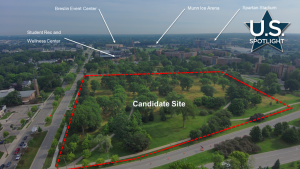A leading Vancouver developer has put out an appeal to lessen risk and regulatory hurdles to make housing happen.
Vancouver-based recently released a video called Housing Crisis 101: Why Homes Don’t Just Happen, which puts forth its views on bottlenecks keeping Canada from building more housing at a rapid pace.
The video has so far gained more than 150,000 views on YouTube. It was released anonymously at first, Wesgroup president and CEO Beau Jarvis said, later sharing the developer created the video.
“The reason we created the video is that we want to start to have more conversation and dialogue over what’s actually happening in the housing ecosystem in Canada,” Jarvis said. “There’s a huge lack of understanding and convenient age-old narrative that we’re in a housing crisis as a result of developer greed, landlord greed. That couldn’t be further from the truth at this point.”
Jarvis said the complexity involved in building housing has increased over several decades to the present where “the returns involved (in building these projects) are no longer commensurate with the risk and have been diminishing for years.”
“Some homegrown Canadian builders are building more housing in the United States than they do in Canada. We really need to stop and ask ourselves why that’s happening,” Jarvis said.
He added the video’s title points to the extensive work needed to build housing even before construction begins.
“People think housing will just get built, let’s form policy around who gets to use it and how it gets used, but the assumption housing will just get built is not a safe one at the moment,” he said.
One of the key problems is that regulations keep changing, Jarvis said, which can lead to conditions that are much different from when a project was initially approved or investment began.
“If you think about any business making a decision to make a capital commitment and take some risk, if they’re good businesspeople or groups they do their due diligence, understand the policy framework including taxation (and other factors) before making an investment decision,” he said.
Jarvis cautioned that in the building industry, his company or other stakeholders can make a decision only to find new policies have been applied.
“Housing takes a long time to come to fruition, five to 10 years from buying the land to turning the key on a project and in that time we see building code and policy changes as well as taxes, fees and levies along the journey of processing a housing application,” he said.
There is little to no protection for changed policies in ongoing projects, he added, “and it creates so much uncertainty and risk that it’s become untenable.”
Jarvis said in order to push more affordable housing forward it’s important not only find common ground and depoliticize the issue but also recognize the current paradigm in Canada is “95 per cent of housing including non-market, is delivered by the private sector including private capital.”
“We can debate whether that’s appropriate, there’s many other countries where the government is more involved in housing…I don’t know what the appropriate ratio is but right now in Canada it’s 95 per cent. If we accept that and then (look at) how to incentivize the private sector to deploy capital, take risk, get compensated for that risk and get housing built, that’s where we need to go,” he said.
To watch the video, click here:










Recent Comments
comments for this post are closed